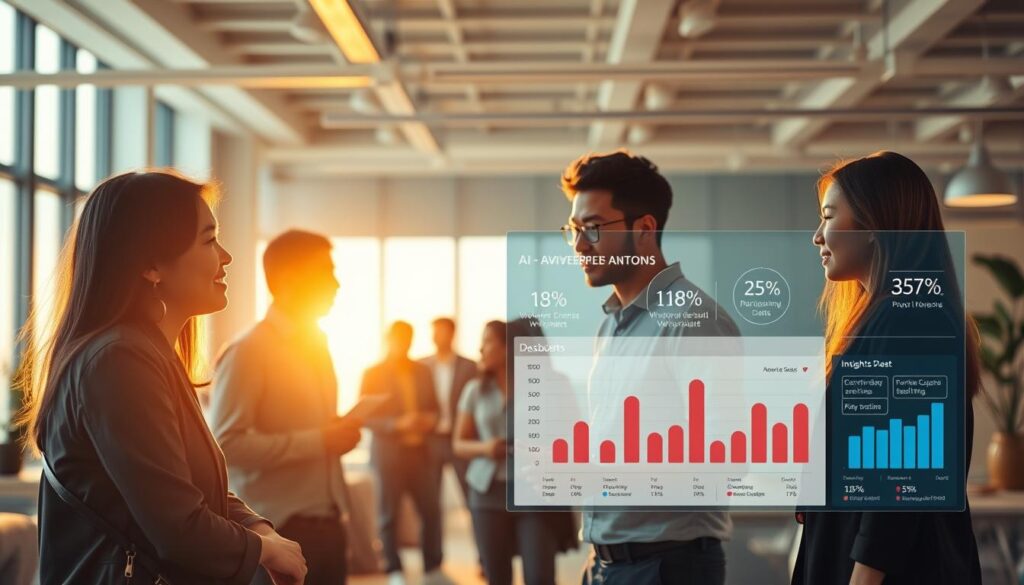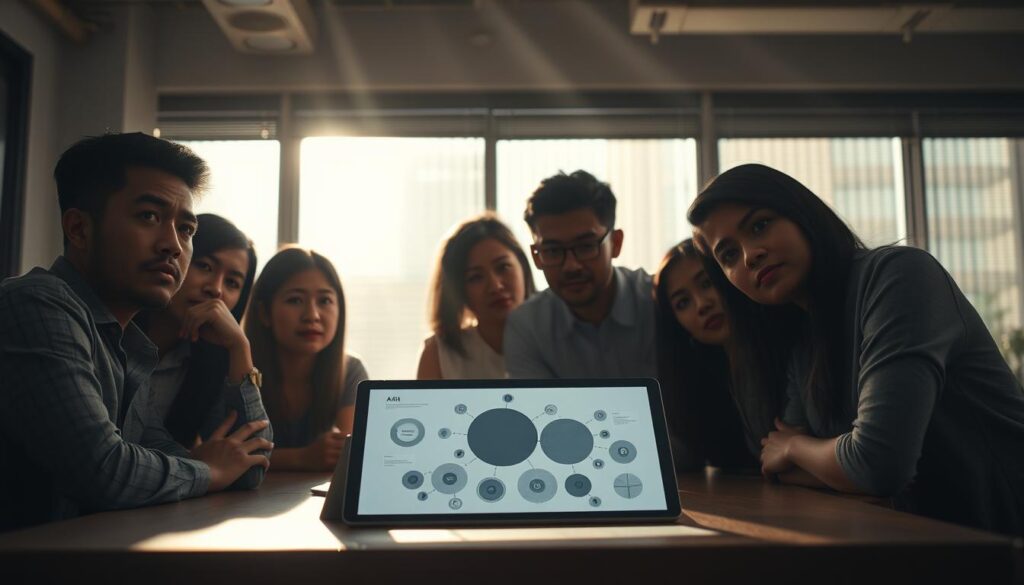What if the secret to finding top talent and innovation is AI? The mix of technology and diversity in the workplace is changing how companies hire. It creates a space where everyone can succeed. As businesses look to the world, diversity is key for success and fairness.
In this article, we explore how AI in Diversity, Equity, and Inclusion (DEI) aids in reaching diversity goals. We’ll see how it helps overcome today’s job market hurdles.
Key Takeaways
- AI is vital for achieving diversity in the workforce by improving hiring.
- Using AI diversity tools boosts innovation and company success.
- Today’s companies must see the value of DEI to attract the best talent.
- AI helps tailor training for diverse teams.
- It’s crucial to tackle algorithmic bias for AI to work well.
- AI can help track and improve diversity, leading to lasting changes.
The Importance of Workforce Diversity
Workforce diversity is key to creating an inclusive workplace. It boosts creativity and innovation. Studies show that diverse teams do better than single-minded ones, in solving problems and coming up with new ideas.
Companies like Grab and GoJek show the power of diversity in Southeast Asia’s tech world. Their teams, with different views, help them adapt and innovate. This makes them better at facing challenges.
By valuing diversity, companies can do better. An inclusive workplace uses the strengths of diverse teams. This leads to more creativity and growth that lasts.
The Role of AI in Modern Hiring Practices
AI is changing how companies find new talent. It makes hiring faster and fairer. Now, companies use AI to look at what candidates can do, not where they come from.
Tools like automated resume scanning and AI-driven interview systems help. They let companies pick the best candidates based on their skills. This makes hiring more fair and diverse, which is key for a well-rounded team.
AI in hiring also makes the hiring process quicker. This means companies can fill important roles faster. By using AI, companies can meet their diversity goals and create a welcoming workplace.

AI Tools for Enhancing Diversity Hiring
In today’s job market, companies are using advanced technology to improve diversity hiring. AI recruiting solutions offer tools that make hiring more inclusive. These tools help automate tasks like reviewing resumes and hiding candidate information to reduce bias.
For example, Talenya helps find and connect with candidates from underrepresented groups. This focus on diversity is key for businesses wanting to stay ahead. It’s not just a trend, but a must for innovation and success.
Pymetrics stands out by using games based on neuroscience to assess candidates’ skills. This approach gives companies a wider view of potential hires. Using AI tools like these can lead to a more diverse team, bringing in fresh ideas and perspectives.
AI in Diversity, Equity, and Inclusion (DEI)
Creating fair workplaces starts with understanding diversity, equity, and inclusion (DEI). These efforts help make sure everyone feels valued and supported. This not only helps employees but also boosts the whole company by encouraging teamwork and new ideas.
Understanding DEI Goals
DEI goals focus on fair representation and giving everyone a chance to grow. It’s about breaking down barriers that stop people from moving up or getting resources. By focusing on DEI, companies create a culture that celebrates diversity and fights against biases.
AI’s Impact on DEI Initiatives
AI changes the game for DEI by helping companies understand their diversity efforts better. It uses advanced analytics to compare DEI work to industry standards. This way, AI helps spot areas that need work and shows how things are improving.
| DEI Initiative | AI Contribution | Impact on Workplaces |
|---|---|---|
| Recruitment | Data-driven sourcing of diverse candidates | Increased diversity in applicant pools |
| Training Programs | Personalized learning paths using AI | Enhanced employee engagement and inclusivity |
| Employee Feedback | Sentiment analysis and trend identification | Improved workplace culture and morale |

Customizing Training Programs with AI
AI technology has changed how we train employees. Now, companies use AI to make training fit each person’s needs. This way, employees get the right skills for their jobs.
AI looks at how each person learns. It makes learning plans that change as the person grows. This makes learning more personal and effective.
Big names like Unilever have started using AI for training. They’ve made learning more fun and accessible for everyone. This helps all employees grow and learn together.
Using AI for training is becoming more important. It helps employees grow and keeps the company improving. This makes the workplace better for everyone.
AI’s Role in Retaining Diverse Talent
Keeping a diverse team is key for innovation and better work. Companies use AI to keep employees happy. AI helps managers understand what makes workers want to stay.
Tools like FeedbackFruits help gather feedback quickly. This lets companies fix problems before they get worse. Leaders can then make work better for everyone, keeping more employees around.
| Employee Satisfaction Factor | Importance for Diverse Talent | AI Contribution |
|---|---|---|
| Work-Life Balance | Reduces burnout and promotes retention | AI analyzes workload and schedules to suggest improvements |
| Career Development | Encourages long-term commitment | AI customizes learning opportunities based on performance |
| Inclusive Culture | Fosters engagement and belonging | AI monitors employee interactions and suggests inclusive practices |
AI helps companies keep their teams happy and diverse. This way, every worker feels important and respected. It’s a big step towards success.

Monitoring and Measuring Diversity
Keeping diversity efforts effective means always checking and analyzing diversity metrics. Companies should use workforce analytics to understand their diversity levels and track progress. AI for diversity helps by giving detailed insights into employee demographics and performance.
Tools like BambooHR’s automated dashboards are key for real-time insights. They help businesses grasp their diversity situation. This way, companies can be open about their diversity work.
AI can make diversity efforts more accountable. Companies need to set diversity goals and check their progress with data. This approach shows a real commitment to inclusivity and helps improve strategies based on analytics.
Challenges of Implementing AI for Diversity
Using AI to improve diversity in the workplace comes with big challenges. AI has great potential, but it can also be biased. It’s important to fix these biases to make hiring fair for everyone.
AI models can learn from old data that shows biases. This can make things worse for groups that are already underrepresented. It’s not fair to them.
Addressing Algorithmic Bias
Companies need to check their AI systems often. These checks can find biases and make sure data is fair. Using diverse data to train AI can help make things more balanced.
Studies show fixing biases can reduce unfair outcomes by up to 40%. This is a big step towards fairness.
Privacy Concerns in AI Usage
Privacy is another big issue with AI and diversity. Using employee data raises ethical questions. Companies must be open about how they use personal info.
If they don’t, people might not trust AI. It’s key to have strong privacy rules and follow the law. For more on making AI fair, check out this resource.

Future Prospects for AI in Workforce Diversity
The role of AI in promoting workforce diversity is set to grow as technology improves. As companies adopt AI, it’s key to look at the future of hiring diversity.
AI’s advancements bring new chances for companies to improve their hiring. These tools help refine how candidates are picked, reducing bias and fitting into the changing DEI scene.
In the future, AI could help companies keep their diverse talent. By using data, they can understand and support their employees better, helping them grow in their careers.
Here’s a look at some anticipated trends in AI for workforce diversity:
| AI Development | Impact on Diversity Hiring |
|---|---|
| Predictive Analytics | Anticipates candidate success and cultural fit |
| AI-Powered Assessments | Reduces bias in candidate evaluation |
| Natural Language Processing | Enhances communication with diverse candidates |
| AI-Driven Training Programs | Prepares current employees for inclusive practices |
These advancements could change how companies tackle diversity. The push for inclusive workplaces will grow as AI gets better, leading to a fairer future.
Conclusion
Using AI tools in workforce diversity can change how companies work. It helps reduce biases and makes hiring fairer. This leads to happier and more loyal employees.
AI is key for finding and understanding diverse talent. It helps meet the needs of different groups. This is vital for success in diversity and inclusion.
AI makes workplaces more inclusive. It makes hiring easier and supports diversity efforts. As AI grows, it becomes a must for achieving diversity goals.
Companies must focus on diversity with AI’s help. This creates fair and welcoming workplaces. It boosts performance and improves company culture.

